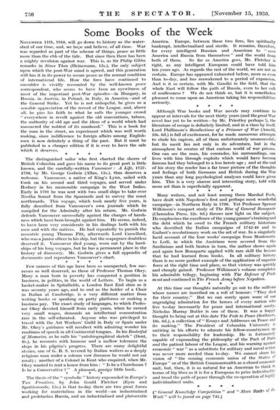Some Books of the Week
NOVEMBER llth, 1918, will go down to history as the water- shed of our time, and, we hope and believe, of all time. War was regarded as part of the scheme of things, peace as little more than the ebb of the tide. But since then there has been a mighty revulsion against war. This is, as Sir Philip Gibbs remarks in Since Then (Heinemann, 15s.), the only subject upon which the post-War mind is agreed, and this generation still has it in its power to secure peace as the normal condition of international life. How the fires have continued to smoulder is vividly recounted by the well-known peace correspondent, who seems to have been an eyewitness of most of the important post-War episodes—in Hungary, in Russia, in Austria, in Poland, in Italy, in America—and of the General Strike. Yet he is not unhopeful, he gives us a sensible appreciation of the record of the League, and, above all, he pins his faith to what he calls the younger crowd " everywhere in revolt against the old conventions, taboos, the authority of old age and the ideas of a world which had massacred the noblest of its manhood." This is a book for the man in the street, an experiment which was well worth /making, since indifference to foreign affairs among English- men is now definitely a thing of the past. But it must be published in a cheaper edition if it is ever to have the sale
which it deserves. * • * *








































 Previous page
Previous page